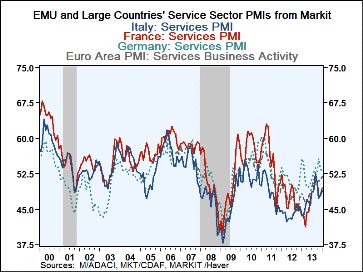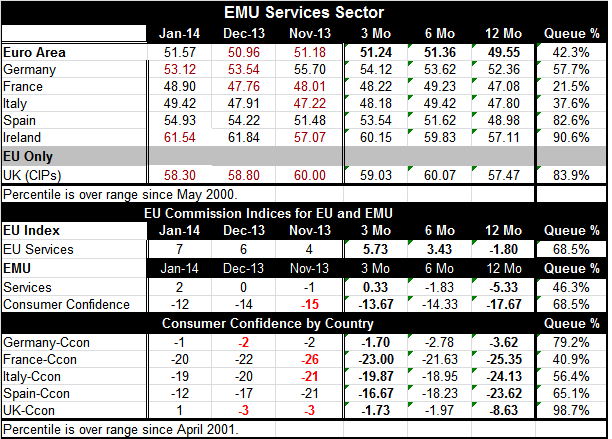 Global| Feb 05 2014
Global| Feb 05 2014EMU Services Continue to Advance at a Slow Pace
Summary
The services reading for the euro area in January 2014 has been finalized at 51.57, up from 50.96 in December. Only two of the five European Monetary Union (EMU) members saw their services sectors backtracking in January; they were [...]
 The services reading for the euro area in January 2014 has been finalized at 51.57, up from 50.96 in December. Only two of the five European Monetary Union (EMU) members saw their services sectors backtracking in January; they were Germany and Ireland. These countries post two of the stronger services readings in the EMU. The German index fell slightly to 53.12 from 53.54. The Irish index slipped to 61.54 from 61.84. Ireland has seen its services metric decline in two of the last three months Germany has seen its services metric decline in each of the last two months.
The services reading for the euro area in January 2014 has been finalized at 51.57, up from 50.96 in December. Only two of the five European Monetary Union (EMU) members saw their services sectors backtracking in January; they were Germany and Ireland. These countries post two of the stronger services readings in the EMU. The German index fell slightly to 53.12 from 53.54. The Irish index slipped to 61.54 from 61.84. Ireland has seen its services metric decline in two of the last three months Germany has seen its services metric decline in each of the last two months.
The United Kingdom, which does not maintain a single currency relationship, is a member of the European Union. It has seen its services sector reading continue to slide in January. Even so the slippage has been slow and the current reading at 58.3 is quite high.
The queue standing tells us where these various metrics sit in their respective historic queues of values. On a queue basis, Ireland has the strongest services sector in the table; its standing is at the 90th percentile of its historic queue. The UK standing is in the 83rd percentile. Spain's is in the 82nd percentile. After that, there's a sharp drop off to Germany which stands in the 57th percentile, Italy in the 37th percentile, and France near the bottom fifth of its queue in the 21st percentile. The 50th percentile of each range is its median. So we have Italy and France with services sectors that are well below their respective medians and the euro area as a whole is below its median reading.
The EU also has a services metric which stands at the 68th percentile of its queue, higher than for the EMU. The EU Commission estimate for the EMU services stands in its 46th percentile, very close to the 42nd percentile in the table where we present the statistics from Markit.
Statistics on consumer confidence by country also offer the percentile of queue readings. In all cases, consumer confidence as a percentile of queue has a higher standing than does the services sector reading. The services sector continues to lag in this recovery. On the EU basis for assessing consumer attitudes, each reporter has a low reading that is negative with the exception of the UK whose reading just popped up to a +1 mark in January.
The presentation of the finalized services data also firms up the manufacturing and services presentations from Markit for January. Together, these reports paint a picture of a still-recovering European Monetary Union but also one in which the EMU is moving slowly. I don't think we can overemphasize the point that not only is it moving slowly, but that members are moving at different speeds. Germany generally is much faster than the rest of the union even though the country has seen some recent setbacks. The Mediterranean countries, when they report statistics (many do not report a separate services index), are lagging the traditional core countries in the Monetary Union. Spain's services sector, an exception to this, is at 54.93. That reading has an 82nd percentile standing in its historic queue; thus, making it the second strongest services sector reporter in the table among EMU members.

Robert Brusca
AuthorMore in Author Profile »Robert A. Brusca is Chief Economist of Fact and Opinion Economics, a consulting firm he founded in Manhattan. He has been an economist on Wall Street for over 25 years. He has visited central banking and large institutional clients in over 30 countries in his career as an economist. Mr. Brusca was a Divisional Research Chief at the Federal Reserve Bank of NY (Chief of the International Financial markets Division), a Fed Watcher at Irving Trust and Chief Economist at Nikko Securities International. He is widely quoted and appears in various media. Mr. Brusca holds an MA and Ph.D. in economics from Michigan State University and a BA in Economics from the University of Michigan. His research pursues his strong interests in non aligned policy economics as well as international economics. FAO Economics’ research targets investors to assist them in making better investment decisions in stocks, bonds and in a variety of international assets. The company does not manage money and has no conflicts in giving economic advice.
More Economy in Brief
 Global| Feb 05 2026
Global| Feb 05 2026Charts of the Week: Balanced Policy, Resilient Data and AI Narratives
by:Andrew Cates






